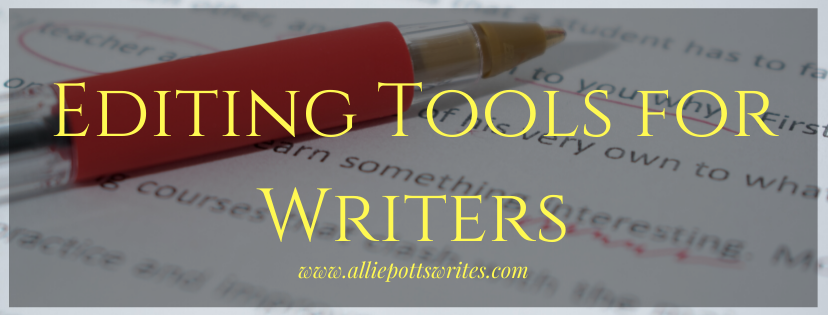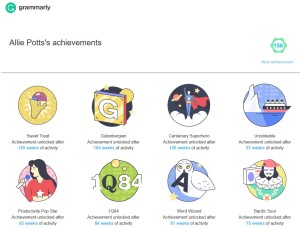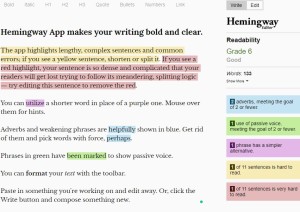Writers, whether they pursue traditional publication under the writer-agent model, publish under their own name, or sign with a smaller imprint, need to edit their work prior to submission. However, while some authors believe their background makes them a grammatical expert, the truth is no one should rely on a single set of eyes.
Unfortunately, professional editing services cost money, and as most reputable editors charge by the word, the cost to help you polish a full-fledged novel quickly adds up. I understand the temptation to do without. That said, I’ve also spent more than I would like to admit on editing services for words that, upon hindsight, never stood a chance of making it to the final proof copy.
Thankfully, while no online editing tool or plug-in is good enough to replace a set of human eyes—for now, there are several programs on the market today that can help you identify more than the occasional typo. Many can now check for tone, misused words, readability, and even provide recommendations to help your pacing. Even better, many of them are offered for free or at a price point that is low enough to pay for itself in short order.
As a result, editing software programs are critical applications for every aspiring author’s toolbox and can help you bridge the gap between rough draft and editor ready. I’ve used dozens over the years, some with more success than others. To save you from making many of the mistakes I have, I’ve compiled this list of those I’ve found to be the best for fiction and non-fiction writing.

Grammarly
According to my Grammarly dashboard, the program has been correcting my text since 2015, so it’s a tool that has definitely impacted my writing. In fact, it has caught at least three errors in this paragraph since I started typing. That said, I’ve found the program misses errors occasionally when I’ve used it with Google Docs and I’ve had to disable it altogether on certain websites, like VistaPrint, as it doesn’t play nice with their text box editor.
Occasional bug aside, Grammarly has a free plan that works well as a spellchecker online via its browser extensions or as a Word plugin. However, there is also a premium version of the service, which can help you check tone, sentence variability, and make sure you aren’t inadvertently plagiarising online content.

- Pros – It’s hard to beat free and is great for catching things like passive voice, incorrect punctuation, or misused homonyms in your daily writing. Plus, Grammarly sends out weekly progress reports telling you fun things like how unique your vocabulary is or how long you’ve kept your writing streak going which is great for staying motivated.
- Cons – It’s much better suited for shorter business or online writing than creative long-form writing as it requires you to disable features like track changes in Word to operate.
ProWritingAid
ProWritingAid is another editing tool you can download and run as a plug-in with Word or Scrivener to check your writing or to check your writing online using its browser extension. Like Grammarly, its Chrome extension is free, however, in my opinion, its paid features, like its overused, cliche, echo, and consistency reports are well worth signing up for the premium version if you are a novelist.

- Pros – I can’t even begin to describe how much time this tool has helped me save looking for things like a missing quotation mark at the end of dialogue and identifying my clutch words and phrases. It is also more stable than Grammarly in certain web forms.
- Cons – The plug-in for Word doesn’t always load correctly the first time, which has caused me to shut down Word and re-open my file on a semi-regular basis. In addition, the reports it runs can be somewhat overwhelming and do take a while to complete a check for a full manuscript.
Fictionary
Full disclosure, I am somewhat biased as I was invited to help test an early version of Fictionary, but I absolutely love what this program has to offer (they’ve also added a ton of extra features since then). Unlike all the other tools in this list, which I consider more copy-editing software, Fictionary is designed to help you automate a development edit.
To use it, all you have to do is upload your manuscript and tag where your plot points are located. Fictionary will then tell you if your pacing is too fast or too slow with a graphical representation of the story arc. It can also help point out things that can help strengthen your story like are the five senses represented in each scene of your writing, has a character gone missing from the story, or are you varying your openings and closings enough to keep your reader interested.

- Pros – While I still put more stock in beta reader feedback than I do a computer program, allowed me to perform a proactive developmental edit before I risked my reputation or burdened advance readers with a two-dimensional story.
- Cons – Fictionary advertises that it can help you evaluate and revise your manuscript against 38 story elements. This sounds like a pro, until you are actually ready to make all those edits. If you are a pantser rather than plotter, you may not have had a goal for each scene in mind related to the overall plot or may have included scenes you loved to write, but don’t serve any purpose. Tagging all these elements in the software can be overwhelming as well as time-consuming. It’s also not free, which is understandable given its value but does offer a free trial.
Hemingway App
The Hemingway App, also known as the Hemingway Editor is offered as either a online editing tool or as a desktop app designed around making your prose more like Ernest Hemingway’s. That is to say, it will help your writing get right to the point, which is clearly something I need more help with. The tool highlights sentences that it deems too long, identifies adverbs that are keeping you from showing rather than telling, and warns you about passive voice, and gives you a readability score which can help you better connect with your target audience.

- Pros – The free online tool loads quickly and features easy to interpret color codes which change in real-time as you edit your copy. The paid desktop version also lets you publish directly to WordPress and Medium, making it a great editing option for serialized stories.
- Cons – Not everyone is a fan of Ernest Hemingway’s style of writing. Was I forced to read 127 pages about an old man trying to reel in a marlin? Yes, I was. Did I enjoy it? No, I did not. Also, it does not integrate directly into other word processing programs, meaning you can use it to tweak your copy, but then will need to export it to Word, text, or PDF before you can do anything with it.
EditMinion
Before I bit the bullet and purchased the premium version of ProWritingAid, I used EditMinion to help polish up my work before sending it out for a professional edit. EditMinion is a completely free online editing program, that helps identify cliche phrases, passive voice, adverbs, and missing dialogue tags. However, it relies on copy and paste, and can only check a chapter of your text at a time.

- Pros – It’s simple and you can’t beat the price point. Also, because there is absolutely nothing to download, you don’t risk corrupting your files or crashing other applications.
- Cons – Copying and pasting each chapter one by one into the program can feel agonizingly slow, especially when you feel like you are so close to the literary finish line you can practically taste it. The tool also does not help your writing outside of the app or let you know if you have accidentally misspelled a character name. As a result, I use it when I need a second opinion but rely on the other products for heavier edits.
I am delighted to report I have reached the end of an editing project yet again and will be releasing my fifth full-length novel, Lies and Legacy: Project Gene Assist Book 3 to the general public in March 2020. You can read more about this series by visiting my Project Gene Assist book page, or by visiting your favorite online retailer to pre-order a copy.


Wow. I had no idea there were so many options! Or that they’d become so sophisticated! Thanks, Allie!
LikeLike
And these are just the ones I liked best! There really are a number of products out there to choose from depending on what type of writer you are. It’s also amused me to learn that I prefer the British spelling of certain words to the American spelling. Grammarly gets all sorts of confused. I’ve had to build out my custom dictionary with the most random entries.
LikeLiked by 1 person
Ha. Funny. Drinking tea with your pinky up too, whilst eating crumpets? 😉
LikeLiked by 1 person
But of course! I’m not a barbarian.
LikeLiked by 1 person
😛
LikeLiked by 1 person
I use the free Scribens Grammar Checker. It is a limited copy & paste site – yet it is well-suited for blog posts.
LikeLike
I’d not heard of that one. Thanks for the mention
LikeLike
I tend to favour British spelling of certain words, too. I feel it’s a nice way to add a bit of colour or humour to a post and also honour our friends across the pond.
Congrats on your upcoming novel!
LikeLiked by 1 person
Thank you! I can’t ever decide if I want to describe something as grey or gray. I get style sheets back from editors that essentially all say, pick one.
LikeLike
Wow. I’m surprised you didn’t throw in a lorey (lorry?) and a lift and a lu (lew?). Do all their weird words start with L?
LikeLiked by 2 people
I tried to think of more, but left my plans in my boot.
LikeLiked by 1 person
Ha!
LikeLiked by 2 people
They do call elevators “lifts” – so, yes.
LikeLiked by 1 person
I have four people edit my work and I edit it a few times [or a few dozen times] before that, and I still always find an error in every book.
LikeLiked by 1 person
I am convinced there is a breed of typo gremlin that is able to camouflage itself from all early read-throughs but then appears the second you send a book to the printer or ebook distributor.
LikeLiked by 1 person
I’m going to get back to this post and read it up… I’ll need this soon I hope 🙂
LikeLike
I hope it comes in handy for you soon too! 🙂
LikeLike
I’m sure it will Allie 😀
LikeLiked by 1 person
Thanks for all the great tips. Excellent information. ❤
LikeLike
I’m glad you find this useful!
LikeLiked by 1 person
Thanks again. ❤️
LikeLiked by 1 person
Fantastic resource, Allie. Thanks for compiling this. And congrats on the newest book!!! So excited for you! 📚🎉
LikeLiked by 1 person
Thank you! Both took far too long to put together, but worth it (I hope) in the end.
LikeLiked by 1 person
Great resource! Thanks a lot!
I’ve been using Grammarly. I agree that it’s better suited for business writings and blogs.
Congratulations on your new book!
LikeLiked by 1 person
Grammarly has saved me from myself more than once. I love it, but when it comes to polishing up a full-length manuscript, I love ProWritingAid more. Thank you!
LikeLiked by 1 person